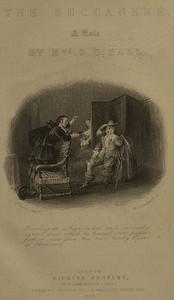Read this ebook for free! No credit card needed, absolutely nothing to pay.
Words: 17266 in 5 pages
This is an ebook sharing website. You can read the uploaded ebooks for free here. No credit cards needed, nothing to pay. If you want to own a digital copy of the ebook, or want to read offline with your favorite ebook-reader, then you can choose to buy and download the ebook.


: The Christian Foundation Or Scientific and Religious Journal March 1880 by Various Walker Aaron Editor - Religion and science Periodicals The Christian Foundation
The Influence Of The Bible Upon Moral And Social Institutions. The Influence Of The Bible Upon Social Life And Social Institutions. Law, Cause, And Agent. The Inconsistency Of Modern Unbelievers Or Materialists. Materialism In Its Bearings Upon Person And Personality. Was It Right? It Only Needs To Be Seen, And Its Ugliness At Once Appears. Did The Race Ascend From A Low State Of Barbarism? The Flood Viewed From A Scientific And Biblical Standpoint. The Mosaic Law In Greece, In Rome, And In The Common Law Of England. Did Adam Fall Or Rise? Did They Dream It, Or Was It So? Miscellaneous.
THE INFLUENCE OF THE BIBLE UPON MORAL AND SOCIAL INSTITUTIONS.
It is profitable for us to occasionally survey the dark arena where men have played their part, in lonely gloom, without a Savior and without a God. Pagan morality, being without the motives and restraints of revealed religion, and guided wholly by the passions and the lights of reason and nature, is grossly defective. It has no settled standard of right and wrong. It is vain to look, in all heathen philosophy for any settled principles of duty or motives that commend themselves to enlightened minds.
How much better are the principles of modern infidels? Bolingbroke's morality is all embraced in self-love. Hobbes claims that the only basis of right and wrong is the civil law. Rousseau says all the morality of actions is in the judgement we ourselves form of them. Shaftsbury says, all the obligations to be virtuous arise from the advantages of virtue, and the disadvantages of vice. Have such moral principles ever reformed the world? Do they reform their advocates? Did you ever know a man to reform after he became an advocate of such principles? Did you ever know a man to reform after understanding and abandoning the Christian religion? If any such ever reformed their lives after setting themselves on Pagan ground, by opposing Christianity, I have yet to learn the fact. It is the morality of a wicked world that simply asks for the profitable, and not the right; which inquires not for duty, but for self-interest--for the opinions of men; it is a body without a spirit--a whitewashed sepulchre--splendid only in sepulchral greatness.
It is not enough for a man to have the right spirit and the right motives, unless he does that which is right in itself. Conscience may be warped by malevolence, selfishness, prejudice, or education, until the man is led to do that which is detestable in the sight of God. The time may come when this man will regret his foolishness, and see that he was wrong, like Saul of old.
Right things may be done from a wrong spirit, and wrong things may be done from a right spirit, but the morality of the Christian religion consists in doing right things from right motives and in a right spirit.
If we would reform men successfully we must bring the conscience under the strong bonds of obligation; we must extend the authority of the great Lawgiver over the understanding, over the conscience, over the memory, over the imagination, over the entire inner man. This alone will stop the germinations of sin, and check wickedness in its conception. This is the tap-root of the tree of virtue--the source of virtuous principles, demonstrating the truthfulness of the axiom, "Make the tree good and the fruit will be good." Simple advantage is not the foundation of virtue; it has a nature aside from its tendencies to worldly profit. Otherwise virtue would often cease to be virtue, and vice would often cease to be vice. Anciently there were moral philosophers who plead that utility was the only foundation of virtue. Paul speaks of some who supposed "Godliness was gain." Such a morality would be the most uncertain thing in the world; give it what name you choose, it is mere selfishness.
THE INFLUENCE OF THE BIBLE UPON SOCIAL LIFE AND SOCIAL INSTITUTIONS.
Man's entire nature forces him directly into a social state. He is destitute of the strength possessed by many of the lower animals, and naturally unable for want of speed to escape their attacks, so care for life leads him into the closest alliances with his fellows. Childhood and old age necessitate dependence, and his wants, during those periods, bring him under obligations to others during his strength and manhood. The social state is also necessary to the development of his intellectual nature, and some of his natural affections can be exercised only in such a state. Benevolence, gratitude, complacency and heroism are not exercised in an insolated condition--they are called out only in mutual associations with our fellow-men.
The noblest efforts of intellectual strength and of human ingenuity are made under the most powerful influence of society. Thus encouraged, men have collected armies, founded kingdoms and governed them. In such kingdoms the arts and sciences have flourished in a greater or less degree, and imperfect morals have crowned their labors and lifted their minds as high as their unaided powers have permitted. Such has been the best condition in which the Scriptures ever found the social state. The structure has been incomplete, resting upon no solid basis, and only imperfectly cemented together. Such a state of society has always been a proper object for the modifying and controlling influences of a purer system of morality, founded upon a pure religion.
What has been the state of society in times past without the light of revealed religion? There are evils in the social state where the Christian religion exists, but they were there before the Gospel of Christ visited those places. It is very common for unbelievers to charge the calamities of the social state to the Christian religion, but it is a dishonorable mode of argumentation. The proper question is this: Has humanity ever been well organized in the social state without the presence and influence of the Bible? Has it ever been well governed under such circumstances? Have men respected the social rights and obligations or properly understood them in the absence of revealed religion? Has the religion of Christ been a disturber of the social organization where social rights were properly understood and regarded? or has it set aside the rights and obligations of men in social life where men were enjoying peaceable, happy relations? Does its legitimate influence make men more wicked and miserable? An honest answer to these questions will commend the religion of Jesus Christ, and do honor to him as our Lord and Master. The Scriptures have been the means of establishing institutions which have stood for centuries. Where society has been disjointed and out of order, without bonds or adhesiveness, the Scriptures have been introduced, banishing disorder and bringing peace and good will to man. They have silently operated in the social surroundings and gradually elevated Pagan lands out of Paganism. They refine and cleanse the cruel, giving them habits which make them at once superior to all Pagans.
Look at Rome and Persia in comparison with England and America. The Persian's religion was the best of all the uninspired religions. They worshiped their unknown god in the sun, moon and stars. In two reigning principles they sought for an explanation of the present state of good and evil mixed, which is the perplexing problem that has always confounded unenlightened reason. The Persian's creed only exercised his intellect and gratified his curiosity. It brought no power to bear upon his social relations. Persian history is a mass of crimes, suffering and intolerance. The government was a despotism, and polygamy gave laws to the domestic and private relations of the citizens.
Free books android app tbrJar TBR JAR Read Free books online gutenberg
More posts by @FreeBooks


: A Yacht Voyage to Norway Denmark and Sweden 2nd edition by Ross William A - Scandinavia Description and travel; Yachting







